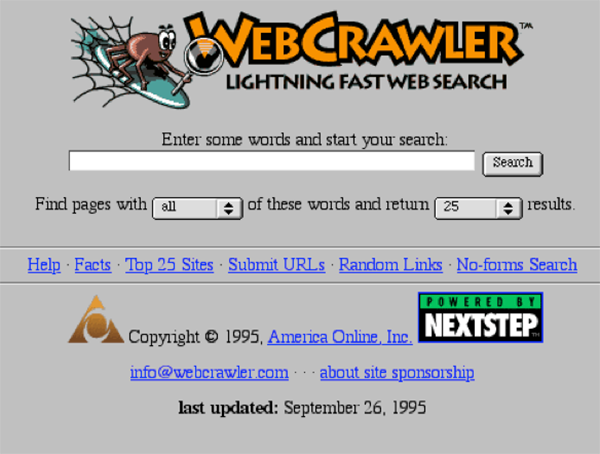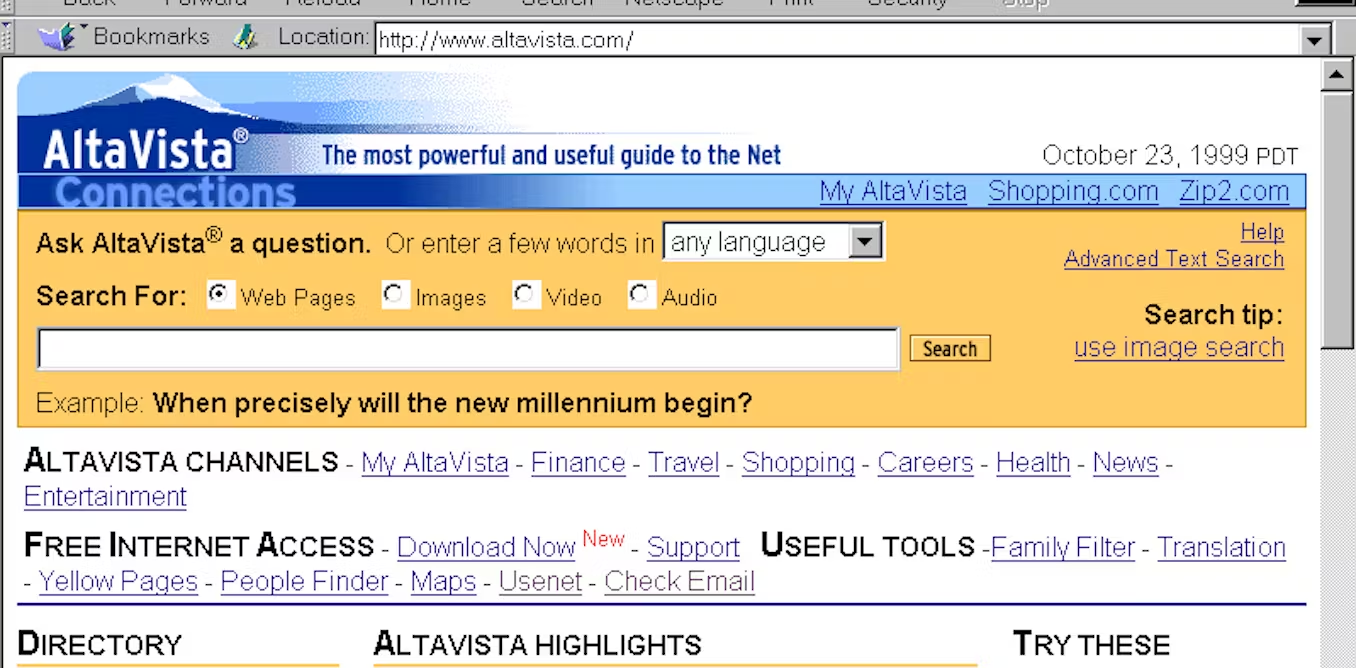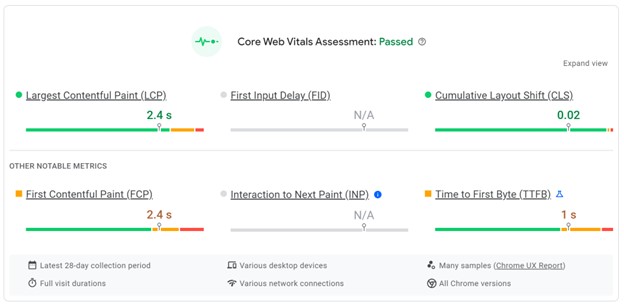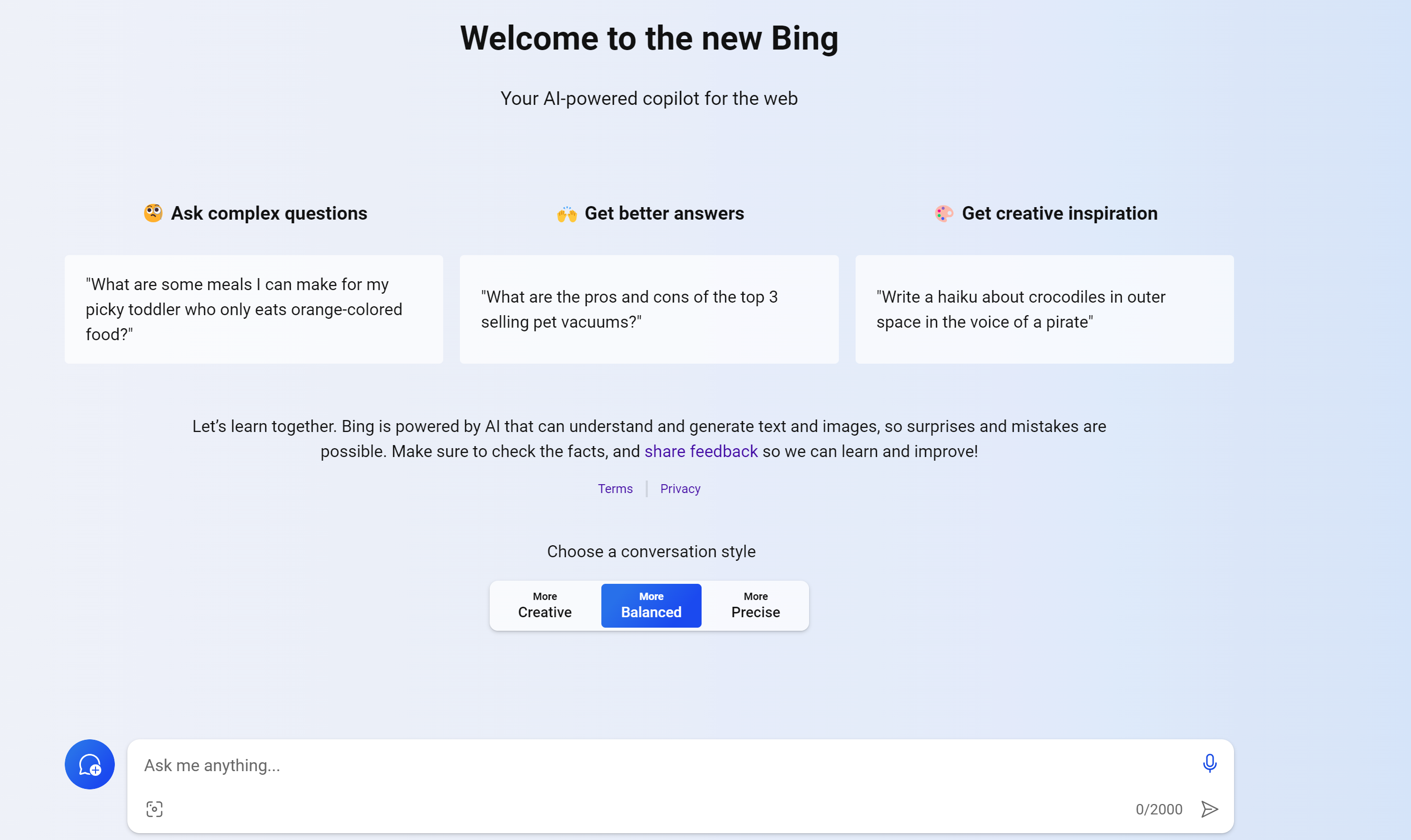15 min to read
Best Alternative Search Engines to Google
Google is our Lord! And we trust our jobs in it! But Google is not alone in the search market, and with the appearance of AI, the fight is just beginning.
But, as with everything in life, all of these services come with a cost, and the value is our searching information. Google uses our data to share with advertisers, and this is the main reason why some users are moving to more private search engines.
Most marketers focus their SEO efforts in Google, but there are other search engines where you could drive more traffic to your digital business. A few months ago we wrote an article about "WHAT SEOS SHOULD KNOW ABOUT DUCKDUCKGO" and is relevant for this article.
Our view on this article
|
|
Privacy: How data is used - Users main concern

From the beginning of Internet, and I still remember the old directory searches like Webcrawler or Altavista, the way information is collected has been a concern and those challenges exploded. A few years later every small kid to grandmas, everyone uses Google. Search engines have become integral tools for users worldwide. However, behind the convenience it host of privacy concerns. For instance, when someone researches a health condition on Google, they might suddenly encounter ads for related medications or treatments on their social media profiles.
Of course, because I've been around for while, I remember vividly 2014, when Yahoo experienced a massive data breach that exposed the personal data of 500 million users, highlighting the risks associated with the vast repositories of information search engines store. Moreover, the interconnectedness of platforms amplifies these concerns. Google's seamless integration with YouTube, Gmail, and other services means that a person's searches, video preferences, and email topics can be compiled to create an uncomfortably precise user profile. While beneficial for a tailored user experience, such deep data integration underscores the trade-offs individuals make between convenience and privacy.
Relevancy of search results

In my early days of using the internet, I remember how search engines like AltaVista and Lycos would present results. They often felt like an unfiltered dump of websites, loosely based on the keywords I entered. It wasn't uncommon for me to wade through several irrelevant sites before finding the nugget of information I was after. I think back to those times whenever I hear someone marvel about the 'golden age of the internet', because the search experience, quite frankly, left a lot to be desired.
Then, in the early 2000s, Google came onto the scene. Their fresh approach to ranking websites using their PageRank algorithm felt revolutionary. Instead of just relying on keyword matches, they considered how sites linked to one another, emphasizing the idea of "web." It wasn't just about the content anymore; the relationships between sites began to matter. I noticed my search results became more relevant, and it felt like the engine was starting to understand the intent behind my queries.
Over time, I observed the emergence of personalized search results. The more I searched, the more the engine learned about my preferences. For instance, after browsing multiple articles about vintage cars, search engines like Bing and Google started pushing car auctions or exhibitions higher up in my subsequent searches. While I appreciated the tailored experience, it did make me ponder about the echo chamber I might be inadvertently entering.
I also witnessed the rise of rich snippets and 'answer boxes' that provided direct answers to queries right at the top of the results page. Searching for a recipe or asking a simple question, I didn't even need to click a link anymore. The required information was displayed prominently, saving me time. And while this made things incredibly convenient, it did lead me to wonder about the impact on websites that relied on clicks and traffic.
As voice search gains traction on smartphones and devices like Alexa or Google Home, I'm seeing another evolution in how search engines provide results. Queries have become more conversational, and the responses more nuanced. It's impressive to how far we've come – from sifting through cluttered pages of results to having a digital assistant understand and respond to our spoken words. The journey of search engines, from those early days to now, is a vivid reminder of the rapid pace of digital evolution.

Speed and user interface.
Looks like today I will keep going down memory lane. But. I still remember the days when I used to enter a search query on a search engine and then take a break to make myself a cup of tea while waiting for the results to load. Watching that little progress bar slowly filling up was a test of my patience. There was this one day while researching for a school project, about dial up internet it felt like an eternity before I could finally access one article. During those moments I often questioned whether the slow speed was really worth the wait.
Things have changed dramatically over the years. With the arrival of broadband and significant advancements in search engine technology waiting for more than a couple of seconds now feels like a delay. I can vividly recall how my browsing habits shifted when Google introduced its lightning search results. It opened up horizons for me allowing me to explore more by delving into topics or going deeper into subjects that piqued my interest. The immediate results made me feel more connected to the expanse of the internet.
There was this incident when I was running late for a meeting and needed directions. I pulled over quickly typed in my destination on my phone and, within seconds I had precise directions displayed in front of me.
I couldn't. Think about how that search result came up saving me from an awkward entrance and potentially upsetting a client. Moments, like these really highlight the importance of getting results in our paced lives.
Nowadays when I'm shopping online and looking for product reviews I switch between tabs comparing items and reading feedback. If a page takes long to load often than not I give up on it and search for something that loads faster. It seems like my patience has dwindled over time. Now I expect things to happen immediately.
As I reflect on my journey it's clear that the speed of search results is not, about convenience; its deeply intertwined with our experience. Whether we need information urgently or we're simply exploring our interests seamlessly the speed at which we access information has become an aspect of our interactions. In this day and age every millisecond counts as it shapes our decisions tests our patience and even affects how trust we put in the platforms we use.
Ethical considerations
There are 2 great articles I love about ethical considerations. We are not going to get into a lot of details about it here but I would totally recommend them:
None of these are very recent but they highlight great aspects of privacy, search engine Bias, Problem of Opacity/Nontransparency, Privacy, Consent, and Non-voluntary Disclosure of Personal Information, Monitoring and Surveillance. as long as the dangers for Democracy, Censorship, and the Threat to Liberty and Freedom (way before our recent elections problems).
Based on all of these considerations, more and more users tend to use different search engines to get their results from. And today, with the launch on Open AI and Bard, the game might change faster as it ever changed.

Bing / integrating ChatGPT
If we look at the podium of search engines, bing would be in third place, right behind YouTube and Google. In terms of how many users are using this platform, it holds 7% of the US market. This search engine has the same essential tools that Google has like translate, rich snippets, conversion calculators, knowledge graphs for hotels and flights and many others.
But, competitors always save their best weapons, and that's something Bing can offer. With Bing you have a more visual approach to your searches, that's because its homepage is dominated by images and videos. But if this is not enough for you to leave Google, then its features like machine-learning predictions for sports, elections and scores.
This is a great platform for designers and digital artists since its image search is more optimized than Google´s, it comes with object-detection intelligence in its image search function. The leading search engine for image search.
For the best part, bing gives you benefits for using its platform. The Bing Rewards benefit their users by awarding them with credits just for using the platform. You just need to stay logged in to earn points while searching, it can be in any platform whether it´s mobile, tablet or desktop.
Source: YouTube.
Yahoo
Before Google, Yahoo was the most used search engine in the world. Nowadays it only has a 3.5% of the market. While its popularity has decreased, there are many good reasons why you should give a try to this platform because it can diversify your digital life.
Yahoo Finance can offer a lot of content that can compete against great financial sites like CNN Money. Its interface is intuitive and accessible for new investors and the most experienced ones. While Google finance is on the competition, it is not on the same place.
If you want to answer even the most absurd question, Yahoo answers allow you to ask whatever you need, or, if your question is common, it could be already answered by many users. In this case, Google has no platform to answer any funny or serious questions in its features.
The website backlink info feature can let you know exactly how many sites are linking to any website, all this with its linkdomain search operator. While Google Webmaster can do this, you have to prove the platform that you own this domain.
The most recent purchase of Yahoo, Flickr, has the top spot on the web. 2.0 photo-sharing market, and it will allow you to find copyright free images for any digital project you have. This platform is similar to Unsplash, which is the website where we get most of our images, it is property of Getty Images.
And for users that like to keep their searches private, Yahoo is better than Google in this aspect.

Source: Unsplash
DuckDuckGO
DuckDuckGo is one of the platforms that has grown the most recently, although it only 1.5% of the market U.S. The main reason of its popularity is its capability for private browsing. This platform doesn't collect private data from its users, and this is why more a more users have opted to choose this search instead of Google.
If you want to search on other platforms like Wikipedia or Amazon, you can click on the feature "bang" and it will take you to your chosen site. The search engine makes clear that if you visit another site, you will be subject to policies, and it includes how they collect your data.
Source: YouTube.
Brave
Usually, the different search engines have a more fair privacy policy with their users, such is the case of Brave, which prides itself on respecting its Internet users and not investigating their activities.
Not only does this platform have greater transparency with its users, but it also rewards its users for using it. They do everything with Brave Rewards or Basic Attention Token, a kind of cryptocurrency that rewards users for seeing ads. To achieve this you just have to set the settings in the search engine so that it rewards you for seeing ads. This cryptocurrency has gained some popularity in the digital currency market and if users continue to migrate to this platform it is likely to take on even greater value.
Source: YouTube.
QWant
Qwant is a search engine that proclaims they "respect your privacy", but, unlike the other platforms that go with this transparency value, the indexing engine of this search engine combines with Bing results prevents you from getting stuck in a filter-bubble. And for readers in Portugal it is important to mention that this platform is based in Paris, so, the European privacy protections are much stricter than other places in America.
This is part of the privacy policies of QWant:
Qwant is committed to protecting your privacy, and that’s at the heart of our philosophy. What you do with Qwant is your privacy and we don’t want to know about it. We don’t keep your search history and we don’t create an advertising profile to target you. With Qwant, you are of course entitled to the rights guaranteed by the European General Data Protection Regulation of April 27, 2016, known as the “GDPR”, but most importantly, we ensure maximum respect for the principles of data minimization and “privacy by design”, i.e., we implement design methods for our services that allow us to collect and process only the data that is strictly necessary. We never try to find out who you are or what you do personally when you use our search engine.
Source: YouTube.
ChatGPT

If you did not hear about ChatGPT, you are living under a rock! ChatGPT took the world by storm! Although not new its unique chat approach was a hit. ChatGPT is a natural language processing tool driven by AI technology that allows you to have human-like conversations and much more with the chatbot. The language model can answer questions and assist you with tasks, such as composing emails, essays, and code. It is not a classic search engine but its recent integration with Bing made Microsoft seach engine one of the most powerful search tools. Here is a complete guide on how you could use the digital marketing funnels to expand your customer base and how sell directly on Amazon with a detailed plan on Amazon listing optimization.
AI-powered search engines
With the explosion of AI and the appearance of ChatGPT a new wave of search engines are here. Some will make it, others will disappear. Here are some we think are solid!
- BraveGPT - Bring the magic of ChatGPT to Brave Search results!
- Jarvis AI - FAQ chatbot for text messaging
- Browse GPT - Convenient Q&A resource for webpages
- Bellow - Machine intelligence search engine
- RepoAI - Scanned GitHub for code errors and improvements
- EnhanceDocs - Open-source AI-powered search engine for your documentation
- Vespa - Vespa is a powerful search engine and vector database that offers unbeatable performance

Source: Unsplash
Niche search engines you should know - have fun exploring
- Yandex: Yandex offers internet search and other services like maps, navigator, public transport, taxi, weather,
- Ecosia: Funny thing about this search engine - Ecosia uses the ad revenue from your searches to plant trees where they are needed the most.
- Startpage: Search and browse the internet without being tracked or targeted. Startpage is the world's most private search engine.
- Searx: Searx is a free and open-source metasearch engine, available under the GNU Affero General Public License
- Swisscows: A privacy-focused, semantic search engine based in Switzerland.
- Gibiru: An anonymous search engine that does not log any user details.
- Lukol: A search engine that preserves the users' privacy by not logging any personally identifiable information.
- Mojeek: A UK-based search engine that offers independent, private web search.
- Yippy: A search engine that groups similar results into 'clouds' (clusters), offering a different way to explore search results.
- Gigablast: An open-source search engine that provides private searching for vast data.
- Metager: A German privacy-focused search engine, run by a non-profit foundation and using green energy.
- Sogou: A Chinese search engine that excels in voice recognition and natural language processing.
- Seznam.cz: A popular search engine in the Czech Republic.
- Naver: The leading search engine in South Korea, offering features like a comprehensive knowledge iN (a Q&A platform), and more.
- Dogpile: A metasearch engine that fetches results from Google, Yahoo!, Yandex, and others.
Social media is used as search
Yes. it's been big and nowadays is huge ( 40% of Gen-Z prefers searching on TikTok or Instagram over Google or 83% of Instagram users say it helps them discover new products and services).
Here is a list of social media platforms and how you can use them:
- You can use Meta to find people, posts, photos, videos, groups and more.
- X-Twitter search feature is quite popular, among users as it helps them find tweets about topics hashtags or from accounts.
- On
LinkedIn users have the ability to search for job opportunities, companies and professionals. - When using
Instagram search function you can look for accounts hashtags and locations. - Pinterest has a search engine that allows users to explore ideas. You can find recipes, home and style inspiration DIY ideas and much more.
- YouTube is a platform where you can easily search for videos on any topic
- Reddit lets you search through posts and comments in communities (subreddits) covering a range of topics.
- TikTok search feature enables users to find accounts that match their interests. You can also discover trending sounds and popular hashtags. Stay tuned for an article on this topic month!
- Snapchat provides a search option where you can look for other users to connect with. Additionally you can explore stories and Discover content.
- Quora is a platform to search for questions asked by users along with their corresponding answers on countless topics.
- Tumblr search function allows you to find blog posts well as GIFs and quotes using relevant keywords and tags.
- Flickr offers a photo search feature where you can explore photos from groups or individuals.
- Vimeo is another platform with a video discovery tool that covers a variety of categories.
- For music enthusiasts looking for tracks or artists across genres or playlists
SoundCloud offers a music search feature. - Slideshare provides the ability to explore content as presentations infographics documents along, with videos. Users have the ability to look up content by using keywords.
- Yelp allows users to search for businesses, in their vicinity and provides access to reviews from users.
- Behance allows users to search for a range of projects, individuals and creative fields.
- Dribbble is a networking platform designed for designers and creatives. It serves as both a portfolio platform for showcasing design work and a space, for exploring and discovering designs created by creatives.
- Goodreads enables users to search for books, annotations, quotes and reviews.
- Twitch offers the option to search for streamers, games, tags or specific streams.
Specialty engines (always open to new ones, if you have new ones let us know!!)
Besides all of the above sometimes we need to go deep into specialized search engines for some clients. Some of these will have a simplified way of indexing (ex: alphabetically) and others will use Google as a Search Engine base. Nowadays, with the evolution of ChatGTP some are using it as well. Feel free to explore and ask us if you have any doubts:
- Wolfram Alpha - is a computational knowledge engine that calculates answers to factual queries instead of providing a list of search results.
- PubMed - is a free search engine accessing primarily the MEDLINE database of references and abstracts on life sciences and biomedical topics.
- Google Scholar is a freely accessible web search engine that indexes the full text or metadata of scholarly literature across various publishing formats and disciplines.
- BASE (Bielefeld Academic Search Engine) BASE is a multi-disciplinary search engine for academically relevant resources, operated by Bielefeld University Library.
- arXiv is a repository of electronic preprints approved for publication after moderation, but not peer-reviewed.
- Semantic Scholar is a search engine developed at the Allen Institute for AI, specializing in scientific literature.
- CiteSeerX is a public search engine and digital library for scientific and academic papers, primarily in the fields of computer and information science.
- PLOS ONE is a peer-reviewed scientific journal published by the Public Library of Science (PLOS).
- JSTOR is a digital library for scholars, researchers, and students, providing access to thousands of academic journals, books, and primary sources.
- IEEE Xplore is a research database for discovery and access to journal articles, conference proceedings, technical standards, and related materials on computer science, electrical engineering and electronics, and allied fields.
- Westlaw is a premier legal research service for lawyers and legal professionals in the United States and around the globe.
- LexisNexis is a legal research and business database service that collates legal resources from hundreds of jurisdictions worldwide.
- CC Search (Creative Commons Search) CC Search allows openly licensed and public domain works to be discovered and used by everyone.
- TinEye is a reverse image search engine that allows you to find where an image came from, how it's used, or find higher resolution versions.
- Zillow is a leading real estate and rental marketplace dedicated to empowering consumers with data, inspiration, and knowledge around the place they call home.
- Indeed is a job search engine that allows job seekers to search for jobs in various fields and locations.
- Monster is a global employment website that lets users browse job listings and also offers online recruitment services.
- Glassdoor allows employees and former employees to anonymously review companies and their management.
- GIPHY is an online database and search engine that allows users to search for and share short looping videos with no sound, that resemble animated GIF files.
- Genius is a vast crowd-sourced digital media knowledge base where users provide annotations and interpretations of song lyrics, news stories, sources, poetry, and documents.
- Goodreads is a website that allows users to freely search its database of books, annotations, and reviews.
- IMDb (Internet Movie Database) IMDb is an online database of information related to films, television programs, home videos, video games, and streaming content online.
- The British Library is the national library of the United Kingdom, providing access to the world’s most comprehensive research collection.
- Food Network website offers thousands of recipes, food news, health tips, and instructional cooking videos.
The most used Search Engines in Portugal
Based on the statistics from Statcounter, these are the most used search engines in Portugal:
- 95.4% use Google
- 2.84% Bing
- 1.11% Yahoo
- 0.39% DuckDuck Go
- 0.15% Ecosia
Why you should use another search engine?
The answer to this question can mostly depend on what type of internet user you are, one who seeks privacy or one who seeks to understand his audience. If the issue of privacy on the web worries you a lot, you have a list of search engines that will make you feel safer on the web, allowing you to enjoy a more transparent and free internet.
Now, as a marketer or business person, leaving Google would be a serious mistake, since it is the most used digital search engine worldwide, and abandoning it would lose almost everyone as your client. Still, it is not a bad idea to look at the other browsers we have mentioned, as another group of potential customers can be found on these platforms. Also, focus on the digital marketing funnel while creating the content for any of the search engines.
Searching for the same term in two different search engines can bring you better results, since they both work with different algorithms and this will help you get valuable information.
Until a next search in your trusted search engine, see you!
Here is a complete guide on the latest revolution - Voice Search Optimization
About CodeDesign
Codedesign is a digital marketing agency specializing in e-commerce and B2B online marketing. Our digital team utilizes the latest digital marketing tools and strategies to help clients reach their business goals. We offer comprehensive services such as website design, search engine optimization (SEO), content marketing, performance marketing, social media marketing, CRM and marketing automation, email marketing, and more. Our experts create and implement customized digital marketing campaigns to increase website traffic, generate leads, and drive sales. Our expertise in e-commerce and B2B marketing allows us to understand the nuances of the digital marketplace and create effective marketing solutions tailored to their client's needs.
CodeDesign is leading:
- Digital Agency Lisbon
- Digital Marketing Agency
- Amazon Marketing Agency
Feel free to contact us to see the unprecedented growth of your business.
Author

|
Author: Bruno Gavino. CEO of Codedesign. Head of Digital. Board Advisor at GLC Group. Board Advisor at CCLI. Board Advisor at ILC. Board Advisor at Portugal Ventures. Digital Marketing. |
|
His proficiency isn't just confined to executive roles; he extends his insights and expertise as a Board Advisor for a range of esteemed organizations. These include the GLC Group, CCLI, ILC, and Portugal Ventures. Each of these advisory roles speaks to his versatility, showcasing his ability to provide strategic guidance across diverse sectors and platforms. Rooted in a deep understanding of digital marketing, Bruno's influence has had a ripple effect, enabling businesses to harness the power of digital transformation and innovative marketing strategies. His leadership and advisory roles, combined with his commitment to pushing the boundaries of digital marketing, solidify his position as a key figure in the evolving digital landscape. |

Add comment ×